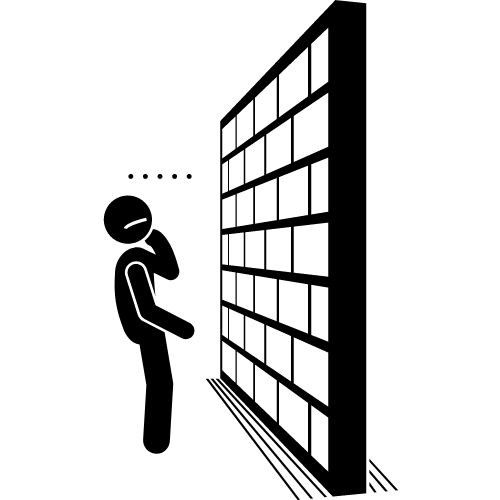Internal Barriers to Boundary Setting
When We Get In Our Own Way
By Robin Arnett - March 6, 2023
It’s easy to blame others when we feel blocked. When we struggle, the temptation is to point the finger elsewhere so we don’t have to take ownership of what’s happening in our lives.
This is definitely the case for boundary setting. We might say that others won’t “let” us set boundaries, but for adults, this is rarely the whole truth.
The fact is, the biggest barriers we face are often happening inside of us.
Our beliefs about ourselves, what we can and can’t do, and what we should and shouldn’t do can all get in the way of confidently setting and holding our boundaries.
This is definitely the case for boundary setting. We might say that others won’t “let” us set boundaries, but for adults, this is rarely the whole truth.
The fact is, the biggest barriers we face are often happening inside of us.
Our beliefs about ourselves, what we can and can’t do, and what we should and shouldn’t do can all get in the way of confidently setting and holding our boundaries.
Some of the most common internal barriers are:
- Fear of conflict
- Low self-esteem or self-worth
- Finding identity through our roles
- Codependency
Boundaries Barrier #1: Fear of Conflict
The first internal barrier that we’ll discuss is fear of conflict. Setting boundaries triggers fear that gets our fight and flight responses in a tizzy, especially if we’re dealing with a difficult person. We may fear blow ups, shut downs, gaslighting, and stonewalling in response to our boundaries. We might even fear losing a relationship all together.
Common fears around conflict:
Common fears around conflict:
- Blow ups: When someone yells, acts out, and basically has a tantrum
- Shut downs: When someone disengages and has trouble communicating
- Gaslighting: When someone invalidates your reality, often using criticism
- Stonewalling: When someone ignores you and ices you out
All of these can be painful experiences, and it’s completely fair to want to avoid them. Luckily, there are ways to make this process a little less difficult. Let’s explore them now.
Facing and Challenging Fear When Setting Boundaries
First and foremost, learning to confront our fears of conflict requires a big dose of self-compassion. This stuff really is difficult, but it’s also worth it. We have to have compassion for ourselves through the tough parts, especially our bodies’ survival responses. Keep compassion top of mind.
When facing our fears of conflict, it’s also helpful to remember a few key points.
When facing our fears of conflict, it’s also helpful to remember a few key points.
Practice Makes Perfect When Facing Conflict
Fear of conflict will subside the more that we face it. Most of the pain that we experience in life comes from anticipation, not the actual event. The more practice you get with healthy confrontation, the less fearful you will be.
Boundaries Benefit - Less Conflict Over Time
It’s also important to remember that boundaries will actually decrease the conflict in our lives over time. Boundaries are about healthy and authentic communication, not about building walls. The healthier our relationships are and the more authentic we are to ourselves, the less conflict we will have to manage.
Reality Check
Quite often, the person protesting your boundary doesn’t actually have any present authority over your life. This is especially relevant when it comes to relationships with parents. Somebody being unhappy with your boundary is not the same thing as having them disallow you from setting it. People will have their feelings and experiences, and you have no control over that response. In reality, you are only responsible for yourself, not others' reactions.
It’s Not Me, It’s You
Remember that someone else's response to your boundary has nothing to do with you or with the boundary's validity. If someone thinks your boundary is stupid, if they’re frustrated by it, or even if they are hurt, that’s about them and their stuff. It has nothing to do with you, your worthiness, or even how much they love you. The boundaries you set only need to feel right to you.
Boundaries Barrier #2: Low Self-Esteem or Self-Worth
Low self-esteem and self-worth can be major factors when you’re setting boundaries. It’s easy to bend ourselves over backward trying not to disappoint anyone else, and end up hurting ourselves instead. Remember, your own disappointment counts!
One of the reasons that boundary setting is so powerful is that it is essentially an assertion of your own rights and your own value. When you behave as if you are worthy, you can grow and nurture that belief until it really feels true.
It can also be helpful to work with a qualified therapist or coach to explore the roots of that low self-esteem and self-worth. Trauma and attachment wounds can have major impacts on how we treat and talk to ourselves, but healing is absolutely possible, and committing to a boundary setting practice is a great start.
Boundaries Barrier #3: Identity Through Roles
One of the biggest internal blocks to setting boundaries can be the roles that we play in our relationships. While these roles can be a burden, they can also give us a sense of identity and a place in the world.
Roles that make boundary setting difficult:
- Pleaser
- The “easy” one
- Helper
- Caretaker
- The one that “does it all”
If finding your identity through roles is something you struggle with, it will be important to explore approaches to strengthening your self-worth that are not related to how much you can do for other people. I promise that there is so much more to who you are than the roles you play, and using boundaries to free up your time and energy can help you in that exploration.
You may also be surprised by the ways that others really show up for you when you start to let go, speak up, or ask for help. Showing up more authentically can strengthen your relationships by letting others in and showing a fuller, realer version of yourself to the world. Again, boundaries are about strengthening connections, not creating barriers.
You may also be surprised by the ways that others really show up for you when you start to let go, speak up, or ask for help. Showing up more authentically can strengthen your relationships by letting others in and showing a fuller, realer version of yourself to the world. Again, boundaries are about strengthening connections, not creating barriers.
Boundaries Barrier #4: Codependency
Codependency is a major risk when we find identity through the roles of “helper” or “healer,” and it can be a major barrier to setting good boundaries. If you have relationships where you are constantly rescuing others, doing things for them, and fighting their battles, you probably have codependent tendencies.
Codependency is characterized by a mutually toxic exchange where one person is overly caretaking of another.
It can appear from the outside that the person receiving this caretaking is the only one that benefits, but the caregiver also has a stake in this dynamic. Codependent caretakers often derive feelings of self-worth and purpose from their relationships, and can also distract from their own issues by focusing on others. If this is the case for you, your boundary setting process will need to start with a major appraisal of your relationship patterns, and some internal boundaries within yourself.
Codependency is characterized by a mutually toxic exchange where one person is overly caretaking of another.
It can appear from the outside that the person receiving this caretaking is the only one that benefits, but the caregiver also has a stake in this dynamic. Codependent caretakers often derive feelings of self-worth and purpose from their relationships, and can also distract from their own issues by focusing on others. If this is the case for you, your boundary setting process will need to start with a major appraisal of your relationship patterns, and some internal boundaries within yourself.
This is also a good place to seek deeper healing to explore the roots of those patterns.
Setting Boundaries Is Worth It
Facing ourselves can be one of the toughest things there is, but the lifelong benefits are more than worth it.If you identify with any of these barriers, reach out to learn more about upcoming course work and boundaries coaching opportunities.

